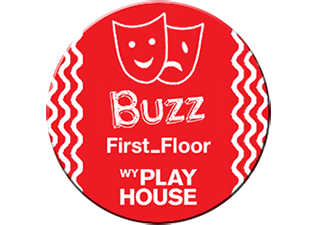
The badge for participants of the drama workshops with Buzz at West Yorkshire Playhouse’s First Floor
A badge to show for it
An online reward scheme has the potential to inspire children and young people’s interest in arts learning, believes Laurie Garrison.
Last autumn children and young people in Leeds were invited to participate in a programme of free arts activities. They built paper cube robots decorated with LED lights, took part in collaborative sculpture workshops, created a 3D film adaptation loosely based on Ted Hughes’ The Iron Man (watch below), acted in drama workshops and threw clay pots in the style of ancient Greeks and Romans. For that they were awarded a Mozilla Open Badge, an online credential that can be collected and shared across social media (or any website accepting the infrastructure). The badges are essentially a visual image with various forms of data embedded in them, including details of the badge issuer, the criteria for awarding the badge and a link to the evidence the learner submitted to earn the badge. They are deliberately endlessly adaptable, which is how we were able to use them in such different contexts in our project.
DigitalMe, the organisation that developed the badges, is a social enterprise committed to helping young people gain recognition for all their learning, both within and outside traditional educational contexts. We believe that the badges scheme has the potential to reinvigorate traditional arts learning for our digital age. We set out to test this hypothesis through the BadgeLAB pilot project in Leeds with ArtForms Leeds, which provided project development and management, and Sheffield Hallam University which carried out the research.
One of the unanticipated findings of the research was that those who commissioned arts activities in schools felt that the scheme could act as a form of quality assurance
Badged activities were offered to learners in three ways:
- At mass participation events such as March of the Robots and MozFest;
- during one-off school arts activities (as part of an established arts learning programme);
- through independent online learning via the school social networking site Makewaves.
Some of the activities were hugely successful with more than 400 children making cube robots at March of the Robots.
To find out about participants’ attitudes toward the digital badges, Sheffield Hallam University researchers carried out observations, interviews, focus groups and questionnaire surveys. We found that teachers were extremely positive about the potential for rewarding and recognising learning. An unanticipated finding was that those who commissioned arts activities in schools felt that the scheme could act as a form of quality assurance. The work of designing a badge, which entails thinking through the task, objectives and outcomes, functioned as reassurance of the rigour of the design of the arts activity.
In addition, managers of the participating arts programmes felt that the scheme had a real potential to enhance the Arts Award. Open Badges offer the opportunity to recognise smaller portions of learning so that those who do not progress all the way to the completion of the award would have the chance to walk away with some recognition for their work. Our research report on Nesta’s Native website describes the project findings in detail.
We are particularly keen to further develop the networking potential of Open Badges for the arts. Both to expand and nurture the network we have begun to create and to introduce badge earners to new learning opportunities. When a user takes a badge, for example, they are automatically directed to other similar badges that may be earned entirely online, in a face-to-face, scheduled workshop or at a specific event.
One of the people involved in the 3D film loosely based on Ted Hughes’ The Iron Man at Studio12 is now working at a post-production company in London, which he says is down to the extra edge the badge gave him.
Since badges are not yet widely recognised, a larger programme that includes a dedicated introduction of badges to a city or region over a period of months would potentially be more successful and cost-efficient than the smaller pilot programme we ran. Such a scheme would set out to badge a range of activities in different places and times so that participants have multiple opportunities to earn badges.
In conclusion, we hope to harness the enthusiasm for badges that was found by our research and to use them to bring a new, online, networked experience to arts learning.
Laurie Garrison is Communications Manager at DigitalMe.
www.digitalme.co.uk
BadgeLAB Leeds is a research and engagement project run by ArtForms Leeds, DigitalMe and Sheffield Hallam University, and supported by the Digital R&D Fund for the Arts.
Join the Discussion
You must be logged in to post a comment.